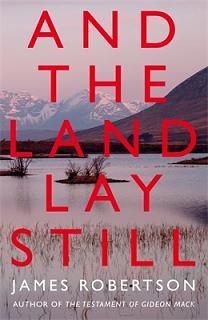 Please buy the book here. Guardian review by Irvine Welsh.
Please buy the book here. Guardian review by Irvine Welsh.
James Robertson’s novel is a highly ambitious work spanning 60 years, looking at the world through a Scottish lens – almost literally, for its framing device is a retrospective exhibition of pictures taken by a renowned Caledonian photographer. And the Land Lay Still examines how the postwar aspirations of many Scots for a socialist Britain gave way to a resurgent nationalism, and a greater demand for home rule.
Ironically, it was Margaret Thatcher, an opponent of devolved power, who possibly brought Britain closer to breaking point than any other politician of that era. The Conservatives were often puzzled by the fact that Scots bought council houses and British Telecom shares, but rather than reward the Tories at the ballot box, instead chose to punish them. I’ve always felt that this much-vaunted political contrariness was about trying to reconcile immediate self-interest with the bigger picture. Scots knew the implicit trade-off was a painful one; possible individual advancement in exchange for the abandonment of the more metaphysical hope that the world could be made into a better place. We reluctantly succumbed to the notion of unquestioning exploitation of the globe’s resources, in accordance with the degree of power a company or an individual enjoyed in the marketplace, but were less than enamoured at having this paradigm thrust upon us. Moreover, there was an intuitive notion that this greed culture would end in tears, and it wouldn’t be those eulogising the sovereignty of market forces who would be picking up the tab.
So we largely settled for the role of disunited opposition, arguing among ourselves about the best way forward. And the Land Lay Still thus features characters debating and squabbling uncomfortably down the years, many of them recognisable archetypes, some decidedly not, practically all of them wonderfully drawn. They’re trying to get by and even prosper, for sure, but at the same time attempting to keep alive and kicking the vision of a more just and equitable society, whether within a British or a Scottish context.
The novel first introduces us to the thoughtful Michael, a photographer of leftish nationalist sympathies, who’s been as slow in coming out as Scottish law was to sanction the idea of gay sex. Michael is ambivalent about being entrusted with the task of curating an exhibition of work by his late father, Angus, a more successful and celebrated photographer.
However, it’s one picture Angus didn’t take that captures Michael’s imagination; when his father entrusted a wandering man to take a rare family snap of both of them with his uncomfortable mother. Before executing this task, then promptly vanishing, the mystery man hands young Michael a pebble. This traveller is subsequently revealed to be Jack, a former prisoner of war, who survived the cruelties of Japanese captivity by sustaining himself with images of Scotland’s landscape. Wandering Jack flits in and out of the story over the years like a ghost, representing the spectre of nationalism, which even when scarcely visible remains a haunting presence.
Jack’s travels begin when he vanishes from his home in a small central belt town, leaving behind his distraught wife and daughter. Even more upset is Don Lennie, his only friend, a socialist mechanic (a true contrary Scot, he has never owned a vehicle), who for most of his life tries to understand Jack’s disappearance in terms of his own traumatic war experience in Italy. Bar-room debaters Don and Jack represent the different strands of radical thought on Scotland’s position in the world: a junior partner in British imperialism, or the last colony of England?
Don has two sons, the sweet-mannered CND activist and teacher Billy, and Charlie, a wayward gangster-soldier. Then there’s the drunken spy, called James Bond. An embittered servant of the British state, Bond takes his revenge on his patronising superiors by bringing down a disgraced Tory MP, David Eddlestane, one of the party’s last representatives in Scotland.
And the Land Lay Still is a wonderful novel – a panoramic, illuminating and compassionate portrait of a turbulent and confused era.
Yes Edinburgh West has a website, Facebook, Twitter, National Yes Registry and a Library of topics on Scottish Politics, including Independence.
